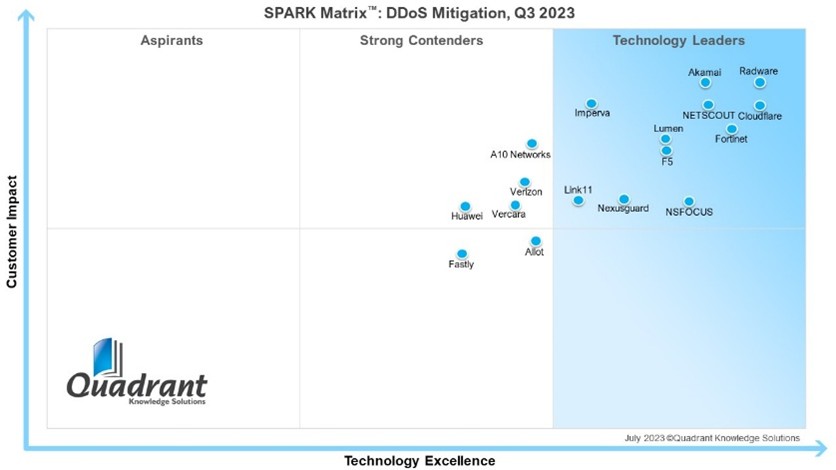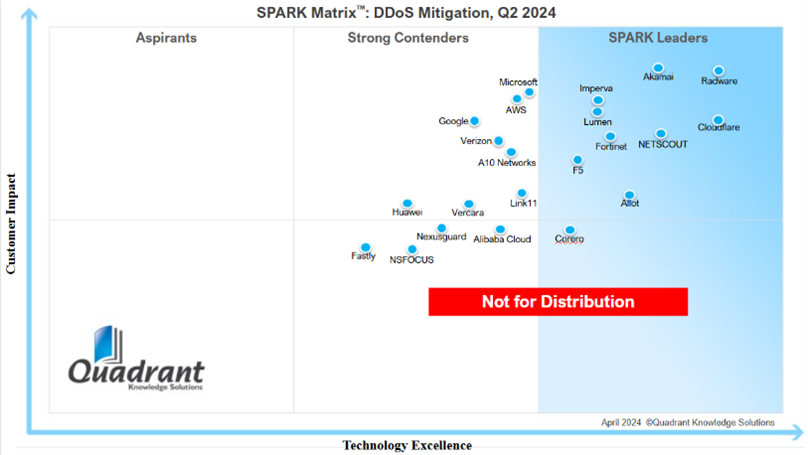QKS Groups’ SPARK Matrix™ for DDoS Mitigation, Q2 2024 & 2023, reveals important shifts in vendor positioning, signaling continued evolution in an already competitive market. With DDoS attacks rising in complexity, frequency, and volume, the market has responded with a sharper focus on intelligent automation, edge resilience, and hybrid defense strategies.
This analysis explores the year-on-year shifts from 2023 to 2024, highlighting how key vendors have moved, who has entered the matrix, and what these changes reveal about strategic priorities and market momentum.


Leadership Continues but with Emerging Tensions
Leaders such as Akamai, Cloudflare, NETSCOUT, and Radware have continued to hold their place in the Technology Leaders quadrant. Their consistent investment in platform quality, global reach, and automated mitigation continues to attract high marks in both technology excellence and customer impact.
But sometimes leadership is not static. Imperva and Allot have notably improved their positions in 2024, climbing further up and to the right. Imperva benefits from enhanced hybrid deployment models and AI-based traffic inspection, while Allot’s leap can be attributed to strategic innovation in network-based detection and telecom-centric offerings.
Strategic Movements and Key Developments
A few vendors have seen their positions weaken in the 2024 matrix. Link11 and Nexusguard, previously in the Technology Leaders quadrant in 2023, have shifted leftward in 2024, reflecting a decrease in customer impact and perceived innovation. This likely stems from limited geographic expansion and slower platform updates.
Fastly, present at the lower end of the matrix, has also slipped slightly in terms of customer perception, despite maintaining strong edge capabilities.
In contrast, A10 Networks, Vercara, and Verizon have held their positions within the Strong Contenders quadrant, showing modest gains in technology alignment while facing strong competitive pressure from cloud-native entrants.
Hyperscalers Enter the Arena
One of the most significant shifts in 2024 is the entry of cloud Hyperscalers:
- Microsoft Azure and AWS have entered the matrix as Strong Contenders with strong customer impact scores. Their integrated DDoS protection, Azure DDoS Protection and AWS Shield, has become an attractive bundled offering for cloud-native enterprises.
- Google Cloud and Alibaba Cloud have also joined, though positioned slightly lower. Their solutions remain early-stage compared to AWS and Microsoft but signal serious intent to expand in this space.
- Corero, another new entrant, appears in the lower-right quadrant, suggesting strong technical differentiation but limited customer reach.
These newcomers are redefining expectations around scale, automation, and integration with cloud ecosystems.
Strategic Themes Shaping 2024
1. Hybrid Cloud Mitigation Takes Center Stage
Vendors such as Radware and Imperva are investing in flexible deployment models that support both on-premise appliances and cloud-based scrubbing centers. This is increasingly important as DDoS vectors diversify.
2. AI-Driven Detection as a Differentiator
Akamai and Cloudflare are pushing boundaries in predictive analytics, using machine learning to identify and mitigate threats before they fully materialize. The focus has moved from reaction to preemption.
3. Customer Experience Is Critical
Customer impact has become a major axis of differentiation. Vendors offering intuitive dashboards, SLA-backed mitigation windows, and responsive SOC support are climbing in the rankings. This is especially evident with Allot’s improvement.
4. Edge Architecture Maturity
The ability to mitigate closer to the attack source remains key. Vendors with globally distributed scrubbing centers and strong peering networks (e.g., Cloudflare, Lumen, NETSCOUT) have a strategic edge in volumetric mitigation.
Conclusion
The 2024 SPARK Matrix™ for DDoS Mitigation reaffirms the strengths of incumbent leaders while showcasing the growing ambitions of hyperscale cloud providers. While Akamai, Radware, and Cloudflare continue to define excellence, vendors like Imperva and Allot demonstrate that agility and innovation still count for much. The entry of AWS, Microsoft, and others indicates a market expanding in depth and scope, with hybrid cloud architectures and AI-driven defenses setting the standard for the next era of DDoS mitigation.
Enterprises evaluating DDoS solutions should pay close attention not just to technical capability but also to the vendor’s ecosystem alignment, platform adaptability, and customer experience strategy.

